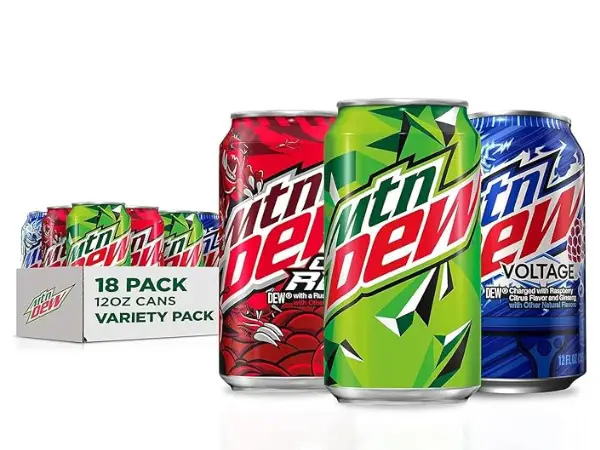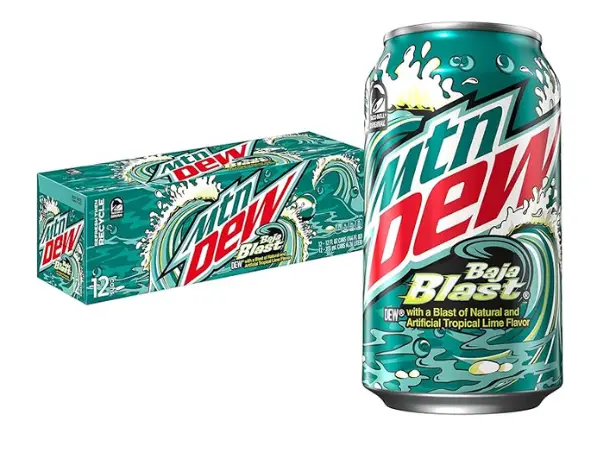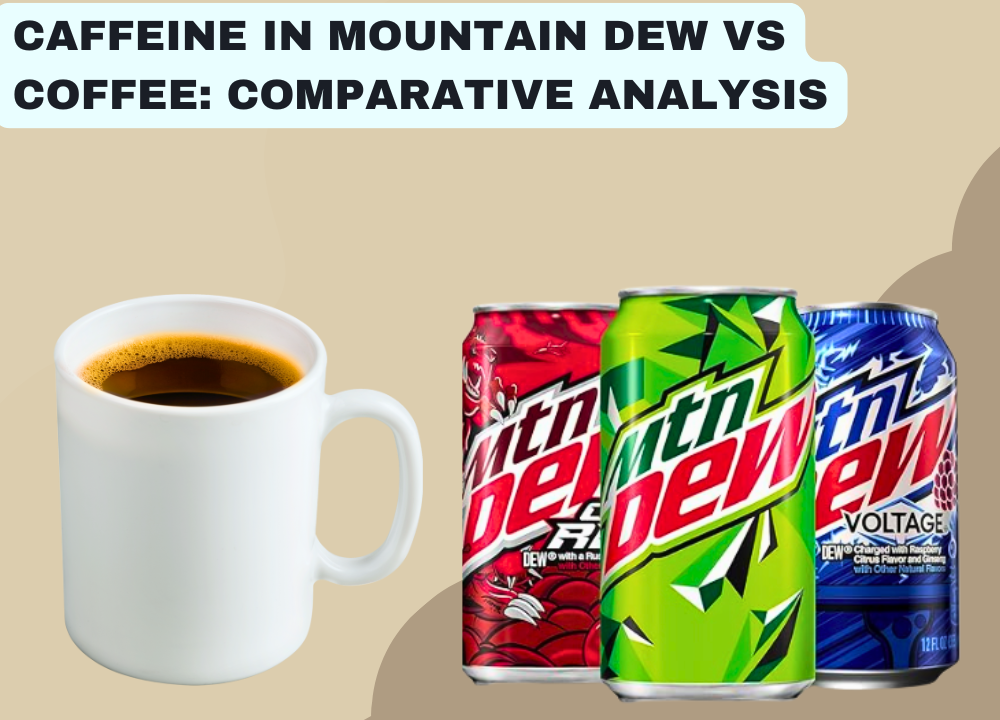Understanding the differences between caffeine in Mountain Dew and coffee is important for many people. Some choose coffee for its strong flavor and higher caffeine levels. Others prefer Mountain Dew for its sweet taste and unique twist.
Understanding Caffeine Content: A Baseline
This guide explores the caffeine levels in these drinks. A clear comparison helps you make informed choices. Knowing the baseline of caffeine can guide you on how much energy boost you receive from each drink.
What Is Caffeine And How Does It Work?
Caffeine is a natural stimulant found in coffee, tea, and soda. It affects the body by blocking a neurotransmitter called adenosine. Adenosine promotes sleep and relaxation. By blocking it, caffeine reduces tiredness and boosts alertness.
Here are key effects of caffeine:
- Increases dopamine production for a temporary energy boost.
- Enhances physical performance.
- Improves mood and cognitive function.
Different drinks contain varying amounts of caffeine. Here’s a quick comparison of common beverages:
| Beverage | Serving Size | Caffeine Content (mg) |
|---|---|---|
| Drip Coffee | 8 oz | 95 |
| Espresso | 1 oz | 63 |
| Instant Coffee | 8 oz | 30–90 |
Caffeine affects everyone differently. Factors include body weight, tolerance, and overall health. Understanding these effects can help you choose the right drink for your needs.
Standard Caffeine Measurement Units
Caffeine is measured in milligrams (mg). This unit helps compare caffeine levels in beverages easily. Each drink has a standard serving size. Common serving sizes include:
- 8 oz
- 12 oz
- 16 oz
- 20 oz
This information helps you understand how much caffeine you consume. It is vital for managing your daily caffeine intake. Be mindful of how different drinks affect your energy levels.

Caffeine Content In Mountain Dew: Standard Varieties
This analysis explores caffeine levels in standard sizes of Mountain Dew. It highlights how they compare to coffee.
Caffeine Content In 12 Oz Mountain Dew
A standard 12 oz Mountain Dew contains 54 mg of caffeine. This amount is less than a typical cup of coffee, which can have around 95 mg of caffeine. Here are some details:
- 12 oz Mountain Dew: 54 mg of caffeine
- Most sodas have lower caffeine than coffee.
- Ideal for a quick energy boost without being overwhelming.
In this size, Mountain Dew offers a refreshing option. The taste is sweet and citrusy, making it enjoyable. It provides a good caffeine kick without too much bitterness.
Caffeine Content In 20 Oz Mountain Dew
The 20 oz Mountain Dew packs a bigger punch with 91 mg of caffeine. This is a significant increase from the 12 oz size. Here’s how it compares:
| Size | Caffeine Content |
|---|---|
| 12 oz | 54 mg |
| 20 oz | 91 mg |
This size is popular among those needing more energy. It’s great for longer tasks or activities. The flavor remains consistent, keeping the sweet and tangy taste.
Caffeine Content In 24 Oz Mountain Dew
The largest standard size, 24 oz Mountain Dew, contains 109 mg of caffeine. This amount is higher than a typical cup of coffee. Here are some key points:
- 24 oz Mountain Dew: 109 mg of caffeine
- Good for those needing extended energy.
- Popular choice for gamers and late-night workers.
With this size, drinkers can enjoy a longer-lasting energy boost. The refreshing taste continues to shine, making it easy to drink during activities.
Mountain Dew Variations: Caffeine Levels
This section explores the caffeine content in various Mountain Dew variations. Understanding these levels helps you choose the right drink for your energy needs.
Caffeine Content In Mountain Dew Kickstart
Each 16 oz can of Kickstart contains a substantial 90 mg of caffeine. This amount makes it a favored choice for those seeking a quick energy lift.
Kickstart also features other ingredients like juice and electrolytes. Here’s a closer look at its benefits:
- Variety of Flavors: Available in several flavors like Fruit Punch and Orange Citrus.
- Low Calorie: Many flavors are low in calories, making it a lighter option.
- Enhanced Hydration: Electrolytes help with hydration, especially during physical activities.
The caffeine level in Kickstart is higher than in standard Mountain Dew. This makes it popular among athletes and active individuals.

Caffeine Content In Diet Mountain Dew
Diet Mountain Dew is another popular choice for those who want flavor without the calories. Each 12 oz can contains 54 mg of caffeine.
Here are some key points about Diet Mountain Dew:
- Zero Sugar: It offers the classic Mountain Dew taste without the sugar.
- Low Calorie Count: Perfect for those watching their calorie intake.
- Refreshing Taste: The citrus flavor remains a favorite for many consumers.
This drink provides a moderate caffeine level. It suits people looking for a refreshing beverage that keeps them energized without high sugar content.
Caffeine Content In 8 Oz Mountain Dew
The classic Mountain Dew is known for its vibrant flavor and caffeine boost. An 8 oz serving contains 36 mg of caffeine. This makes it a lighter option compared to Kickstart and Diet Mountain Dew.
Here’s a breakdown of its features:
| Serving Size | Caffeine Content |
|---|---|
| 8 oz Mountain Dew | 36 mg |
This caffeine level is ideal for casual drinkers. It offers a quick refreshment without overwhelming caffeine. The classic taste appeals to many and fits well in social settings.
Mountain Dew Vs. Coffee: A Direct Comparison
Understanding the differences between Mountain Dew and coffee can help you make informed choices. This section compares caffeine content, effects, and serving sizes.
Caffeine Per Serving Size: Side-by-side
When comparing Mountain Dew and coffee, serving size matters. Here’s a quick look at their caffeine content:
| Drink | Serving Size | Caffeine Content |
|---|---|---|
| 8 oz Brewed Coffee | 8 oz | 95 mg caffeine |
| 12 oz Mountain Dew | 12 oz | 54 mg caffeine |
| 20 oz Mountain Dew | 20 oz | 91 mg caffeine |
As the table shows, an 8 oz cup of brewed coffee contains about 95 mg of caffeine. In contrast, a 12 oz serving of Mountain Dew has only 54 mg of caffeine. Even at 20 oz, Mountain Dew still trails behind coffee with 91 mg of caffeine.
Caffeine Per Ounce: A Detailed Analysis
Let’s break down caffeine content per ounce for a clearer view. The caffeine levels differ greatly:
- Coffee: 12 mg per ounce
- Mountain Dew: 4.5 mg per ounce
- Espresso: 63 mg per ounce
The higher caffeine in coffee can lead to a quicker and more effective energy boost. However, Mountain Dew’s lower caffeine content can result in a milder, more sustained release of energy.
Effects Of Caffeine: Mountain Dew Vs. Coffee
The effects of caffeine in Mountain Dew and coffee differ significantly. Coffee provides a stronger and longer-lasting energy boost due to its higher caffeine content.
In contrast, Mountain Dew offers a milder energy effect. Although it contains less caffeine, it still provides a lift. However, the high sugar content in Mountain Dew can lead to an energy crash later.
Many people enjoy coffee for its rich flavor and consistent energy boost. Others may prefer the sweet taste of Mountain Dew.
Factors Affecting Caffeine Absorption And Effects
Several factors affect how caffeine is absorbed and its impact on the body. These include individual tolerance, metabolism, and additional ingredients.
Individual Tolerance And Metabolism
Individual tolerance to caffeine varies based on genetics and caffeine habits. Some people metabolize caffeine quickly, while others take longer. This affects how caffeine impacts their energy levels.
- Sensitivity differs from person to person. Some may feel jittery after one cup, while others need more.
- Frequent caffeine users may experience reduced effects. Their bodies adapt, leading to less noticeable stimulation.
Studies show that caffeine metabolism can depend on:
| Factor | Impact on Caffeine Absorption |
|---|---|
| Genetics | Determines how quickly caffeine is broken down. |
| Age | Older adults may metabolize caffeine more slowly. |
| Pregnancy | Can slow down caffeine metabolism significantly. |
Understanding personal tolerance helps in choosing the right beverage. Some may prefer coffee for its steady release, while others might enjoy Mountain Dew’s quick energy boost.
Other Ingredients: Sugar And Additives
Mountain Dew contains high sugar levels, which affect energy spikes. In contrast, coffee is often consumed with minimal additives.
- Artificial sweeteners in diet sodas may impact metabolism. Some people may not process these additives well.
- Excess sugar in Mountain Dew can lead to weight gain and crashes. This is important for those watching their sugar intake.
In terms of caffeine effects:
- Mountain Dew provides quick energy but can lead to fatigue.
- Coffee is linked to improved focus and metabolism.
Choosing between these drinks depends on personal goals. If quick energy is needed, Mountain Dew might be preferred. For sustained alertness, coffee is a better option.
Health Implications: Mountain Dew Vs. Coffee Consumption
Health implications vary between Mountain Dew and coffee consumption. Overconsumption of either can cause jitters, anxiety, and dehydration. Mountain Dew’s high sugar content can lead to additional health issues.
- Excessive sugar intake is linked to obesity and diabetes.
- Caffeine in coffee may improve cognitive function and metabolism.
Consider the following:
| Beverage | Health Implications |
|---|---|
| Mountain Dew | High sugar, risk of crashes, potential weight gain. |
| Coffee | Linked to improved focus, but can cause jitters if overconsumed. |
Making informed choices about consumption can lead to better health outcomes. Understanding how each drink affects the body is crucial for overall well-being.

